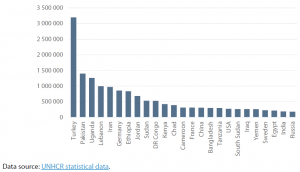The vast majority of refugees are hosted by developing countries. According to the UNHRC, ‘as mass displacement across the world continues to grow, it is usually low- and middle-income countries that shoulder much of the responsibility for refugees’. Some civil-society voices have criticised developed countries for hosting but a small share of refugees: ‘It is deeply disturbing that rich countries that have the capacity to receive and host refugees are not stepping up to this responsibility. To date 85 % of the world’s refugees are hosted by developing countries’. However, such criticism does not take into account the relative population size of the host countries. In mid-2017, Europe (not counting Turkey, which alone hosted 3.2 million people, mostly Syrian refugees) hosted 2.5 million out of a total of 18.5 million refugees in the world, i.e. 13.5 % above its share of the world’s population. In the same year, sub-Saharan Africa was the region hosting the most refugees in the world: 5.7 million.
The fact that most refugees are hosted by developing countries is also due to the geographical proximity of the latter to areas of conflict. People fleeing war, persecution and violence often seek refuge in neighbouring countries.
As Figure 1 above shows, from among the 25 countries hosting the world’s biggest refugee populations, only three – Germany, France and Sweden – are EU Member States.








Be the first to write a comment.